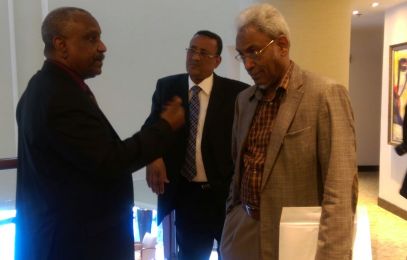Sudanese security talks on the Two Areas make no progress
November 22, 2015 (ADDIS ABABA) – Security talks between Sudan’s government and the Sudan People’s Liberation Movement/North (SPLM-MN) on South Kordofan and Blue Nile has made no progress as the government chief negotiator returned to Khartoum for consultations.

On Sunday evening, Sudanese government chief negotiator Ibrahim Mahmoud Hamid decided to leave the negotiations venue and return to Khartoum amid unconfirmed reports that the chief of the AU High Implementation Panel (AUHIP) Thabo Mbeki also decided to leave the negotiations venue on Sunday night.
Hamid who left the Ethiopian capital alone as his delegation remains at the venue of the talks seemingly he returned to Khartoum for further consultations. He is also excepted to brief the media about the government position in the talks on the Two Areas.
On Saturday, the AUHIP proposed to the Sudanese government and the SPLM-N to sign two agreements to the cessation of hostilities and humanitarian access to the war affected areas in order to discuss the remaining political issues within the framework of the national dialogue inside the country.
But sources from the mediations say the two parties disagree on the meaning and the interpretation of the terms “cessation of hostilities” and “comprehensive ceasefire”, saying the government is refusing the demand of the SPLM-M to sign a partial ceasefire that would allow for delivering humanitarian aid to the Two Areas.
The government believes that partial ceasefire will allow the SPLM-N forces to rearm and receive food supplies, he further said.
“In any case, we are making our efforts to reconcile between the two sides on this issue and the positions [of the sides are not far apart]”, said the source
However SPLM-N secretary general and head of negotiating team, Yasir Arman, said in a press briefing that they diverge on how to join the national dialogue.
“It was a mistake to begin the (national) dialogue without other political forces. We will not accept to join the dialogue (under the current conditions) . So we want a preparatory meeting leading to a new constitutional process, also the dialogue must be equal,” Arman said.
He added that the current dialogue process is entirely controlled by the ruling national Congress Party (NCP) from its chairpersonship to fees paid to the participants. He stressed that that the national forces will not accept this matter but it is ready to sit down with the ruling party to establish an equal process leading to equal dialogue.
The SPLM-N secretary general further explained that the SPLM-N rejects a partial solution, while government delegation wants immediately after the signing of the cessation of hostilities to negotiate an agreement on the Two Areas with the SPLM-N alone.
He explained the position of his movement calling for a solution for the problem of the Two Areas within the framework of a national agreement discussed by all the political forces.
Arman who was seen in a private discussion with the heads of the two government delegations in an attempt to break the deadlock, said they disagree also on the humanitarian access to the war affected areas.
He stated they want an agreement similar to Burgenstock deal signed by the government and the SPLM in January 2002, allowing multiple access of humanitarian delivery from inside Sudan, Ethiopia and South Sudan.
The SPLM-N objected in the past, the participation of the workers from government humanitarian body saying they are infiltrated by the security agents.
(ST)
